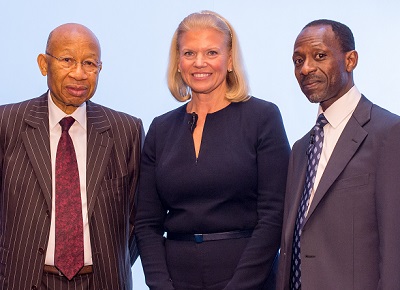E-Business
IBM Invests in Accelerating Innovation in Nigeria

IBM has announced it is further expanding its operations across Africa with the opening of an IBM Innovation Centre in Lagos, Nigeria.
The new facility is designed to accelerate innovation for Nigerian and West African business and IT skills.
Using the centre, clients, IT partners, developers, entrepreneurs, venture capitalists and academics can now access enhanced cloud capabilities and extensive big data and analytics resources.
Adoption of cloud technology in Africa has reached a tipping point and in Nigeria alone, cloud usage is expected to more than double to 80 percent of businesses in the next year.
In addition, the growing proliferation of mobile phones and tablets is accelerating the opportunity to interpret data patterns to anticipate needs and deliver improved services.
As the local demand for these types of technologies and skills increases, Africa is quickly moving to the center of global attention as the last big emerging market of the current economic era.
According to the IMF, Sub Saharan Africa is set to be the world’s second fastest growing region with projected economic growth of over six percent this year.*
To take advantage of this explosive growth, the new centre will focus on providing solutions that use Big Data & Analytics and cloud technologies to solve key local challenges such as improving government services, digitising banking services and enhancing customer centricity in telecommunications.
Clients will be able to participate in virtual and in-person training, test out new products, network with peers from around the world, and receive mentoring and guidance from IT and business experts.
For example, the centre will provide clients hands-on access to cloud-based industry solutions such as IBM Intelligent Operations designed to provide cities, governments and utilities with a central command center for the use of predictive analytics to enhance efficiency and manage all their operations.
“Our investment in this centre is in line with our strategy to help fuel growth in Nigeria’s IT sector and to support the use of advanced technology service delivery for the public sector and commercial business growth, particularly expansion in West Africa,” said Taiwo Otiti, IBM West Africa country general manager.
“IBM Innovation Centres are designed to help clients envisage their future, illustrated using IBM Social, Mobile, Analytics and Cloud solutions, combined with industry focused experience and expertise. Through this centre, we will bring the reach of IBM’s global capabilities and thought leadership closer to local and regional clients.”
IBM believes its new test and demonstration environment will serve to cut the costs and complexity of assessing IT solutions, but will also assist CIOs in presenting strong business cases for advanced technology adoption.
The company is already working with the Union for International Cancer Control (UICC) to create the world’s largest and most comprehensive clinical dataset on cancer patients by building cancer registries in developing nations, beginning in Sub-Saharan Africa.
“Innovation has become a key driver of positive change in developed economies, and IBM has blazed the trail once again in this market with its new Innovation centre,” said Mr Victor Hammond, managing director of Lagos-based Bankers Warehouse Ltd, a non-bank financial services institution and Nigeria’s leading cash management and cash-in-transit service provider.
“I foresee this facility becoming a key driver of technology innovation in Nigeria, helping to promote the culture of knowledge incubation and scientific enquiry in all sectors of the national economy.”
IBM has been operating in Africa since the 1930’s, and today has a direct presence in more than 20 African countries, including: Nigeria, Tanzania, Senegal, South Africa, Morocco, Egypt, Tunisia, Algeria, Ghana, Nigeria, Kenya, and Mauritius.
IBM plans to continue strengthening this network with more new facilities, offerings and partnerships in the next few years.
The new centre joins a worldwide network of over 41 other IBM Innovation Centers in 33 countries including South Africa and Kenya.
Through this network, IBM connects local companies and entrepreneurs with technical and industry experts around the world and can support growth with introductions into new markets.
E-Business
South Korea Joins List of Countries Banning DeepSeek over Security Concerns

South Korean authorities have temporarily blocked new downloads of the DeepSeek artificial intelligence (AI) app, citing concerns over the company’s handling of user data.

The country’s Personal Information Protection Commission (PIPC) announced the decision on Monday, saying that the Chinese AI startup had failed to fully comply with South Korea’s data protection laws.
According to PIPC, DeepSeek recently appointed legal representatives in South Korea and admitted to partially neglecting regulatory considerations regarding user privacy.
“The Chinese startup appointed legal representatives last week in South Korea and had acknowledged partially neglecting considerations of the country’s data protection law,” the PIPC said.
The commission added that the app’s service would resume once the company implements improvements in accordance with national privacy laws.
According to Reuters, when asked about South Korea’s move, a spokesperson for China’s foreign ministry said the Chinese government prioritises data privacy and security, ensuring compliance with legal standards.
The spokesperson also said China does not require companies or individuals to collect or store data in violation of laws.
The ban follows similar actions by other governments.
On February 4, Australia prohibited the use of DeepSeek on government devices due to security concerns.
Italy’s privacy regulator recently blocked the AI service, citing the company’s failure to address data policy issues.
Taiwan has also warned about potential risks related to cross-border data transmission and information leaks.
Also, regulators in Ireland and France have launched investigations into DeepSeek’s data-handling practices.
DeepSeek gained global adoption for its advanced human-like reasoning capabilities and open-source model.
In January, it surpassed OpenAI’s Chatgpt as the most downloaded free app on the Apple store.
E-Business
AU Endorses Nigeria as AfCFTA Digital Trade Champion

The African Union (AU) has officially designated Nigeria as the Digital Trade Champion under the African Continental Free Trade Area (AfCFTA) Digital Trade Protocol, citing the country’s leadership in digital enterprise and innovation.

The endorsement came at the 38th Ordinary Session of the Assembly of Heads of State and Government, which concluded on Sunday in Addis Ababa.
Nigeria’s proactive role in advancing the digital trade protocol, adopted in February 2024, was a key factor in the decision.
The AfCFTA Digital Trade Protocol encompasses eight annexes covering crucial areas such as rules of origin, digital identities, cross-border data transfers, online safety, and financial technology. The protocol is expected to provide a robust framework for Africa’s digital economy.
According to a statement issued on Monday by Special Adviser to the President on Information and Strategy, Bayo Onanuga, former President of Niger Republic and AU AfCFTA Champion, Mahamadou Issoufou, praised Nigeria’s leadership, particularly for convening the Digital Economy Roundtable in January.
“No organization, region, or continent has negotiated or adopted such a comprehensive legal instrument on digital trade, positioning the African continent to benefit from the digital economy for innovation and job creation,” Issoufou said in his progress report to the AU Assembly.
He also highlighted Africa’s growing influence in digital innovation, particularly in mobile banking and financial technology, and noted that the protocol would create an enabling environment for young African entrepreneurs.
“The AfCFTA Protocol on Digital Trade will establish a conducive environment for these young people to fully participate in Africa’s digital economy,” Issoufou added.
Reflecting on the roundtable in Abuja, he commended President Bola Tinubu and his administration for facilitating discussions with key stakeholders.
“The Roundtable was attended by young pioneers in Fintech, mobile banking and other areas of the digital economy. It was evident from the discussions that young people are eager to take advantage of Africa’s digital economy through the AfCFTA Protocol on Digital Trade”, he said.
Speaking at the AU summit, Nigeria’s Minister of Industry, Trade and Investment, Dr. Jumoke Oduwole, described the AU’s endorsement as a milestone in Africa’s economic development.
“Africa has demonstrated global leadership by pioneering the first-of-its-kind AfCFTA Protocol on Digital Trade—establishing a comprehensive regulatory framework,” Dr. Oduwole stated.
She emphasized that the protocol is a “game changer” for the continent, predicting that it would generate millions of jobs, contribute billions to Africa’s GDP, and attract significant investments in digital infrastructure.
E-Business
Schmidt, Ex Google Chief Says AI Risky in Terrorist Hands

Eric Schmidt, former Google CEO has expressed concerns about the extreme risks posed by artificial intelligence (AI) falling into the hands of terrorists or rogue states.

Eric Schmidt, former Google CEO
He warned that nations such as North Korea, Iran, and Russia could adopt AI technologies to develop weapons capable of causing significant harm, including biological weapons.
Schmidt urged governments to oversee private tech companies, emphasising, “The real fears I have are not the ones most people discuss about AI, I talk about extreme risk.”
“I’m always worried about an ‘Osama Bin Laden’ scenario, where truly evil individuals take control of some aspect of modern life to harm innocent people,” he added.
With private companies driving AI advancements, he stressed the need for careful government monitoring and regulation. “It’s really important that governments understand what we’re doing and keep their eye on us,” he said.
His remarks followed a two-day AI summit in Paris, where the UK and the U.S. declined to sign a communiqué outlining the future direction of AI. The declaration on “inclusive and sustainable artificial intelligence for people and the planet” was endorsed by 57 countries, including India, China, the Vatican, the EU, and the African Union Commission.
The UK justified its decision, stating that the agreement lacked “practical clarity” on global AI governance and national security concerns.
Schmidt supports U.S. export controls restricting the sale of advanced AI microchips to certain countries, aiming to slow adversaries’ progress in AI research.
He also highlights the importance of international collaboration on AI safety, suggesting that cooperation with nations like China is essential to addressing global AI challenges.

 E-Financial2 days ago
E-Financial2 days agoSERAP Gives CBN 48-Hour Ultimatum to Withdraw ATM Fee Hike

 E-Financial2 days ago
E-Financial2 days agoFG Seeks Fresh $300m Loan from World Bank for Health Security

 General News2 days ago
General News2 days agoFG Drops Merger of NCAA, NAMA

 Telecom22 hours ago
Telecom22 hours agoToriola, MTN Nigeria CEO again Defends Tariff Hikes amidst Backlash

 News2 days ago
News2 days agoBinance Chief Insists Some FG Officials, Reps Demand $150m Bribe

 News2 days ago
News2 days agoinDrive Unveils Cashless Bank Transfer Feature in Nigeria

 E-Business22 hours ago
E-Business22 hours agoSouth Korea Joins List of Countries Banning DeepSeek over Security Concerns

 E-Financial2 days ago
E-Financial2 days agoCardinalStone Acquires Radix Pension Managers

























